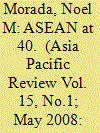| Srl | Item |
| 1 |
ID:
082439


|
|
|
|
|
| Publication |
2003.
|
| Summary/Abstract |
In 2007, the Association of Southeast Asian Nations attempted to celebrate its 40th founding anniversary with a bang as it was about to set another milestone, which is the signing of the ASEAN Charter. However, the celebration was overshadowed by the political crisis in Myanmar following the military's crackdown on protesting monks and their democratic supporters. The inability of ASEAN to influence events in that country became the focus of public attention in the region and the international community. Even the much-vaunted milestone of finally having an ASEAN Charter was a major disappointment for many in Southeast Asia as the final document signed by ASEAN leaders was everything but bold, forward-looking, and transformative. It became an object of criticism mainly by some think tanks and civil society groups in the region because it paled in comparison to the recommendations of the Eminent Persons Group that drafted the blueprint of what the ASEAN Charter should look like.
This article describes the major milestones and turning points of ASEAN's regionalism project over the last forty years. It also attempts to identify the major issues and challenges to ASEAN's community building efforts in the future. The main argument of this article is that ASEAN's continuing relevance to the people of the region can be ensured only if it seriously opens up to greater participatory regionalism. Only then can ASEAN be transformed into a truly people-centered organization.
|
|
|
|
|
|
|
|
|
|
|
|
|
|
|
|
| 2 |
ID:
082437


|
|
|
|
|
| Publication |
2008.
|
| Summary/Abstract |
Climate change is affecting economics, lifestyles, culture and societies around the world. In Japan average temperatures have risen higher than the average global figure, and ramifications are seen in plant and animal life. Analysis of the consequences of global warming was reported by the Intergovernmental Panel on Climate Change in Paris in 2007. The international community must begin renewed international cooperation as the first commitment period of the Kyoto Protocol concludes in 2012. The basic mechanism must improve on the framework of the Kyoto Protocol. Japan, with scarce natural resources, must establish energy security and devise an overall policy in its aim to become a low carbon society.
|
|
|
|
|
|
|
|
|
|
|
|
|
|
|
|
| 3 |
ID:
082438


|
|
|
|
|
| Publication |
2008.
|
| Summary/Abstract |
The awarding of the Nobel Peace Prize to the IPCC signifies that the world recognizes the urgency of climate change which is threatening human security. In light of the scientific evidence, globally coordinated immediate action is required to build "Low Carbon Societies." In the course of this effort, Japan can make a contribution to history by establishing a Japanese Model of low carbon society utilizing its advantages in science, technology and finance.
|
|
|
|
|
|
|
|
|
|
|
|
|
|
|
|
| 4 |
ID:
082440


|
|
|
|
|
| Publication |
2008.
|
| Summary/Abstract |
The rise of China provides a major challenge to the United States, the undisputed hegemon in the Asia-Pacific region since the second world war. This development provides regional states with an opportunity to shape the regional security architecture by adopting an inclusive approach to China. The role of the Association of Southeast Asian States (ASEAN) tends to be under-estimated by Western scholars who often see the European model as the only approach to regional integration. This paper discusses the significant achievements of ASEAN in serving as a catalyst for the establishment of regional institutions. Such institutions could serve as instruments for the management of China's relations with Japan and India. It is contended that the emergence of Asian powers, especially China, will result in a challenge to the Washington Consensus of Western norms and values focusing on individual rights which have governed international institutions. The rise of China is likely to see the application of a Beijing Consensus emphasising the balance between individual rights and social obligations, which would resonate positively in the region. In the twenty-first century, global institutions will need to reflect the norms, values and practices of global society and not just Atlantic perspectives
|
|
|
|
|
|
|
|
|
|
|
|
|
|
|
|
| 5 |
ID:
082436


|
|
|
| 6 |
ID:
082441


|
|
|
|
|
| Publication |
2008.
|
| Summary/Abstract |
Members of the IAEA Board and of the Nuclear Suppliers Group may need to decide this year whether to go along with the US proposal to allow nuclear cooperation with India despite its non-NPT status. Permitting nuclear sales to India would have important geo-strategic benefits by strengthening its partnership with the US. Yet granting India an exception to nuclear supply guidelines would also have significant non-proliferation disadvantages by weakening the NPT. Whether it would assist India's nuclear weapons development is unclear. If India were to agree voluntarily to cap its production of fissile material, this would rectify the greatest lost opportunity of the US-India nuclear agreement. The non-proliferation benefits that the Bush Administration has claimed for the accord, such as that it brings India into consensus on the Iran nuclear issue, are neither guaranteed nor long-lasting. Perhaps the best that can be said is that the transparency the accord will bring to some aspects of the Indian nuclear program could contribute to arms control measures in the future.
|
|
|
|
|
|
|
|
|
|
|
|
|
|
|
|